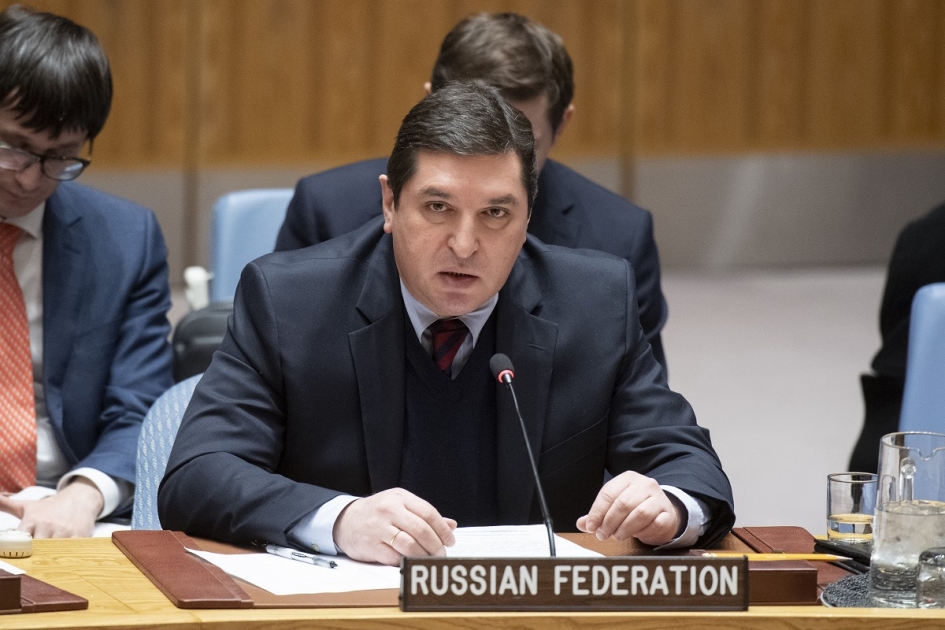Statement by Deputy Permanent Representative Vladimir Safronkov at the UN Security Council Meeting on the Middle East, including the Palestinian question
Mr. President,
We are thankful to Mr. N.Mladenov for his meaningful report on the situation in the Middle East, at the occupied Palestinian territories, as well as for the assessments of the state of Palestine-Israeli affairs. The Special Coordinator has clearly stated that it is the negative trends that prevail in the Middle East settlement, as well as the violent narrative that affects the civil population.
The recent developments show that the situation is fragile and volatile. We strongly condemn missile launches from Gaza against Israeli settlements. We condemn any manifestations of terrorism and indiscriminate strikes. We call upon all sides to keep from using force and making unilateral steps, including illegal settlement activities and provocative rhetoric.
Today, when the Middle East and North Africa continue to develop acute conflicts – in Syria, Yemen, Libya – the lack of progress in the Palestinian settlement brings about serious concerns. The remaining status quo is no longer viable. We have no right to tolerate this.
There is an alternative to such developments. It lies in galvanizing the collective efforts to relaunch the negotiation process that should seek to implement the two-State solution that envisages peaceful and safe coexistence of the two States – Palestine and Israel within the internationally acknowledged borders.
The issue that ranks high on our agenda is the revitalization of channels for dialogue. We call upon both Palestinians and Israelis to adopt the logic of negotiation process that will base on the acknowledged international legal base that includes relevant UN SC resolutions, ‘Madrid principles’, including the principle ‘land for peace’, the Arab Peace Initiative and the roadmap of the Middle East Quartet of Mediators.
The 2016 report of the Quartet remains quite pertinent, because it clearly specifies the steps that should be taken in order to overcome the negative trends prevailing in the Middle East settlement.
Any laid out plans to achieve the all-encompassing settlement in the Middle East should proceed from these multilateral solutions and take into consideration the position of the Arab world. This position is reflected in the Arab Peace Initiative that was endorsed at the Summit of the League of Arab States held in 2002. This is the prerequisite for the effectiveness and efficiency of any peaceful project.
Russia will set forth its steps to bring positive momentum back to the Palestine-Israeli profile. The proposal to convene in Russia a summit between the leaders of Palestine and Israel remains on the table.
We believe the role of regional stakeholders, in particular of Egypt and Jordan, is very important. We proceed from the assumption that the inter-Palestinian Meeting held in Moscow in February contributed to the efforts of the Egyptian colleagues that they take in order to bridge the gap among the Palestinians.
Let me reiterate that any international and regional steps in the inter-Palestinian reconciliation can be effective only if they are taken in coordination with the legitimate administration of the State of Palestine under the lead of M.Abbas
It is necessary to establish full-fledged operation of the UN Relief and Works Agency for Palestine Refugees in the Near East (UNRWA). This is a crucial mechanism for easing the burden of the Palestinian refugees in the Middle East, who had to flee the areas of their residence because of wars and conflicts.
For its part, Russia will continue to assist the Palestinians both bilaterally and through budgetary contributions to UNRWA. The agency should remain the key effective mechanism to improve the situation of the Palestinian refugees and find a sustainable solution to the refugee problem. We see no other way to ease the burden of refugees and of the countries who gave shelter to them.
Mr. President,
History tells us that only negotiations are able to guarantee sustainability of eventual solutions. Therefore now we should focus on relaunching the political dialogue between Palestinians and Israelis. This dialogue will raise fundamental security aspects and the issues related to the final status, including the status of Jerusalem, refugees, and borders. Multilateral compromise-oriented dialogue based on mutual respect and search for negotiated solutions, - this is what should define the paradigm of searching for solutions in the Israeli-Arab relations.
Unilateral steps, e.g. recognized sovereignty of Israel over the occupied Syrian Golan Heights do not change the status of these territories, that has been defined by corresponding SC resolutions.
The status of these territories is subject to direct Syrian-Israeli dialogue that has taken place recently. This approach has been endorsed by the UN Secretariat and by the overwhelming majority of States. It fully corresponds to the resolutions adopted in this very hall by consensus of the Security Council.
Mr. President,
There is little doubt that no one is able to solve the package of problems of the Middle East if acting alone. Individual efforts should be put together. Only a broad inclusive international coalition could overcome the terrorist threat. Only active cooperation in compliance with unified rules of the game could settle multiple regional conflicts, including the one between Palestine and Israel. We invite everyone to become part of such cooperation and interaction.
Thank you for the attention.
